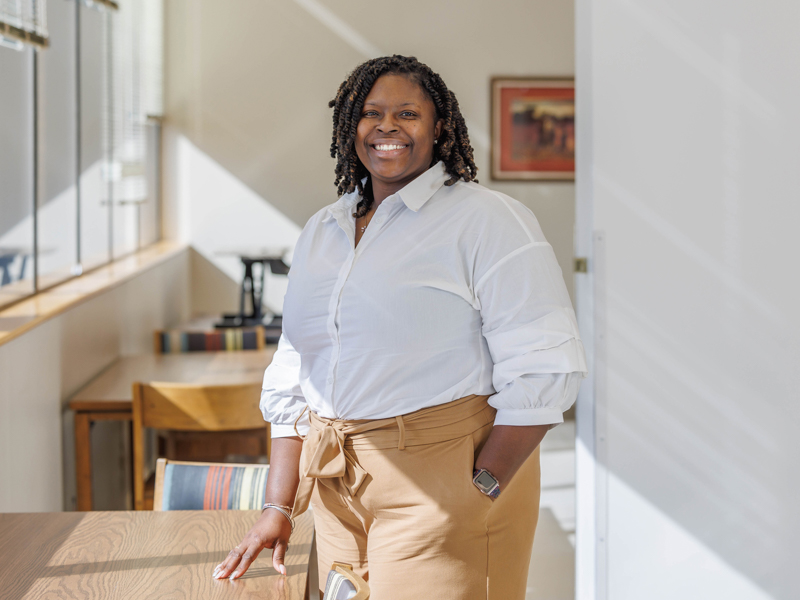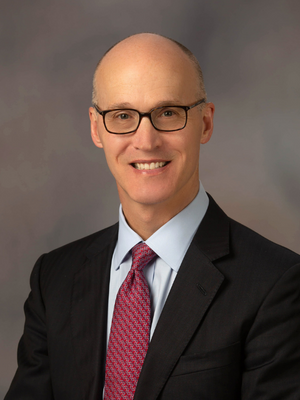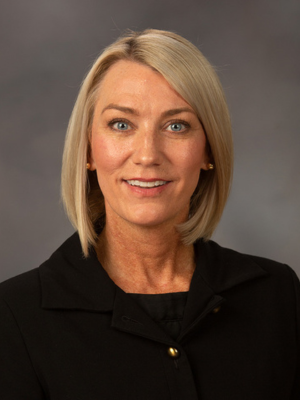Front and Center: Dr. Robin Benson Thompson

Dr. Robin Benson Thompson grew up in area known for its poverty, where dreams could be discouraged and “can’t” was almost a catchword.
Throughout her career – as a nurse, teacher and education administrator – the way she has approached patients, students and anyone else within her orbit was shaped by her early years in Holmes County.
“I come from the poorest county in the state,” she said, “and I believe that’s why I have a passion for people from lower socio-economic backgrounds.
“And why it’s so rewarding to see students from similar areas accomplish things others never expected them to – just because of where they were born.”
This is no less true for Thompson now as she picks up another gauntlet in her career at the University of Mississippi Medical Center: director of the newly-created Office for Academic Innovation, taking on such sweeping matters as artificial intelligence and online learning.
Another responsibility particularly plugs into her background and heart: “Identifying resources for economically-disadvantaged students,” she said.
Known as Open Educational Resources, it’s one of the three main areas Thompson is focused on, said Dr. Scott Rodgers, associate vice chancellor for academic affairs, who orchestrated the creation of the OAI.

“Not only can it cut costs for students and faculty, it can also improve their access to resources from around the world,” he said.
Free teaching tools, downloadable textbooks and lecture materials are among them, Thompson said. “The office is also responsible for identifying resources that are affordable and meet the needs of everyone. We want to support all of our students.”
As a student herself, growing up in the Holmes County town of Lexington, Thompson often needed support – especially moral support.
“There were people who didn’t like to see others succeed,” she said, “but when they told me I couldn’t, my granny and mom told me I could. To have someone say, ‘You can’ meant the world to me.”
Then, there was Shirley Smart, whose last name was no lie. “She was an English teacher at my high school,” Thompson said. “During my senior year, she quoted something she read to me: ‘You do not have to let the opinions of others become your reality.’
“I have kept that with me since I was 17.”
Determined to prove her supporters right, she enrolled at Alcorn State University and earned a nursing degree. In high school, she had decided to be a pediatric nurse – “I always loved kids,” she said.
In 2005, she got her opportunity at UMMC, at Children’s of Mississippi. Although she enjoyed taking care of patients, Thompson, who is from “a long line of educators,” realized she relished teaching, too. She returned to Alcorn and earned her MS in Nursing Education.
“As a nurse in health care, I loved breaking everything down so patients could understand what we were doing to help make them better,” she said.
“As a nurse educator, it was those lightbulb moments for my students, when you could see that they understood complex disease processes or could perform difficult skills. Then, it was watching them start their careers or open their own clinics; knowing I had a small hand in that was the greatest reward I could ask for.”
That would come as no surprise to Dr. Angela Burrell, chair and associate professor of the Doctor of Health Administration Program in the School of Health Related Professions, where Thompson earned her DHA three years ago.

“I have observed her unwavering commitment to finding improved ways to support her students, advocating for systemic changes in education and exploring how technology can contribute to a more sustainable and just future,” Burrell said.
“What I find most commendable is her remarkable ability to balance pursuing advanced degrees and continually advancing as a healthcare educator, all while navigating the responsibilities of single motherhood.”
SHRP covers a big chunk of Thompson’s resume. She still teaches there in the DHA program, and online with the title of associate professor of health sciences; since 2017, she has been director of instructional development and distance learning.
That’s all part of an abundant career that included positions as hospital staff RN, nursing instructor, nursing education consultant, academic coach and nurse residency program coordinator/health educator.
Now, as the OAI director, Thompson is also within the purview of the Office of Academic Affairs; its leader, Rodgers, has welcomed her as a “highly intelligent, thoughtful and creative” colleague.
“I want UMMC to be well-positioned in academics when it comes to innovation,” Rodgers said. “In this office, Robin is the one who knows the most about this.”
That expertise will come in handy as UMMC’s six health professions schools confront the promises, and risks, of artificial intelligence, or AI – also known by brand names such as ChatGPT.
Its inescapable influence is one reason Rodgers thought it was time to introduce an Office of Academic Innovation to UMMC. With AI, intelligent machines or systems learn and think much like humans do, solving problems, making decisions, even writing papers.
“Schools around the country are grappling with this” how to benefit from the power of AI while preventing abuse of AI,” Rodgers said.
To that end, Thompson is consulting with the Office of Faculty Affairs, and will do so soon with the Office of Student Affairs and each school’s administrator.
“We want AI to work at this institution – for the faculty and the students,” Thompson said. “But also make sure that it’s used responsibly and ethically.”
Thompson’s time and office space now alternate between SHRP and the Rowland Medical Library. the official seat of the OAI. There, Thompson also serves an associate professor of academic information services and reports to Elizabeth Hinton, library director.
“The library is a central part of the campus,” Hinton said. “We work with everybody, and we’re thrilled to have Dr. Thompson, who’s fully entrenched in the technological world, including AI.
“For several years, she has also been director of eCampus; she possesses extensive knowledge about embedding technology into education.”
Thompson remains dedicated to eCampus, the third major area of focus in her new job. “Its reach extends beyond online and distance learning to different teaching environments and tools,” she said.
“There is a gap between the way faculty have traditionally taught and the way today’s students learn – they want things on demand and delivered electronically. We have to make sure faculty know how to use the technology, and bridge the gap between traditional and digital-age learning.
“One of the things I like most about my work is engaging with people about things they may have had no direction on before, helping them find answers. I’ve always had a heart for helping people.” And telling them they can.


